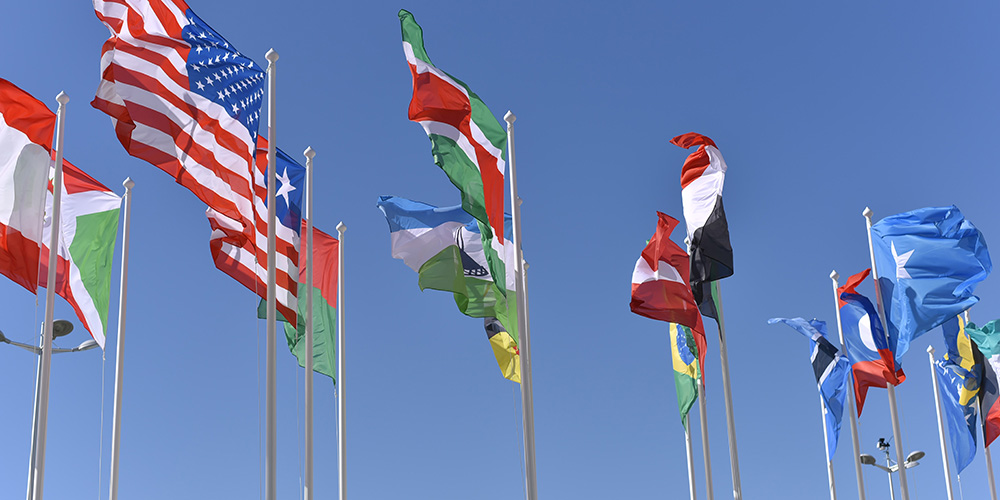Personal experience is key to our view of globalization
Threat or salvation? The way in which people judge globalization depends on their own experiences. They carry more weight than forecasts of potential gains. This has been shown in an experiment by researchers at the University of Basel.
03 November 2022 | Noëmi Kern
For decades, global political and economic relations have been seen as the secret to greater prosperity, and have therefore been consistently nurtured and intensified. Recently, however, the process of globalization has faltered – people have become more critical of this political and economic integration, by which they mean the opening up of goods, service and labor markets and a reduction in the scope of political decision-making. “We’re even seeing a counter-trend, a kind of ‘disintegration’. Examples include Brexit, the more protectionist US trade policy, a certain drifting apart in the EU and the tensions in the relationship between the EU and Switzerland,” says Rolf Weder.
The Professor of International Trade and European Integration at the University of Basel and his co-authors in Basel and at the Chapman University (USA) wanted to know how the prospect of gains arising from globalization affects the behavior of individuals. In other words, is support for economic integration dependent on the absolute value and distribution of potential gains? The researchers have reported on their findings in the journal Experimental Economics.
Different scenarios observed
The researchers conducted an experiment with 900 people, based on a case in which economic integration held out the prospect of higher financial gains for the study participants than a closed economy. It was difficult to actually realize these gains, however, as they were hypothetical and demanded cooperative behavior.
The researchers investigated the way in which potential gains influence behavior by observing the responses of test subjects in different scenarios. The gains varied according to the treatment group and were distributed in different ways. The subjects were subsequently able to decide whether, based on their experiences, they would prefer to continue in an integrated economy or return to a closed economy.
“This approach has the advantage of enabling us to control numerous influencing factors. This was crucial for the issue under investigation,” adds Rolf Weder. The data collected allowed for a targeted evaluation that would have been almost impossible outside the laboratory.
Experience carries more weight than good prospects
The experiment confirms that not everyone benefits from globalization, despite integration promising potential gains for all. The unequal distribution of gains, however, has no influence on the extent to which those involved support economic integration and how effectively they cooperate when it comes to realizing the promised gains.
Rather, support for globalization depends on the individual’s own experience with economic integration. “Based on our findings, the subjects can be described as ‘economically rational’ – and we hadn’t expected to see such an unambiguous result,” says the economist. He adds that personal experience tended to carry more weight than projections or promises, so according to this experiment, showing people the potential gains of globalization would do little to convince them of the benefits of economic integration.
Loss does not automatically mean rejection
The opposite is also the case – the easier it is for individuals to benefit, the more they support globalization. At the same time, this reduces the likelihood of them being among the losers. Confidence in the central institutions that stabilize the global economy is a key factor in this. “There is currently a large deficit here, however,” Weder points out.
But even the losers of globalization are not fundamentally averse to economic and political integration. The more the state cushions the impact by providing them with temporary support in the form of social measures, the lower the level of rejection is likely to be. “For me, this provides confirmation of the established mechanisms in countries like Switzerland and highlights the weaknesses of systems like the one in the US,” says Weder.
“It would now be interesting to investigate how people react when they have the opportunity to compensate the losers, offsetting their losses by sacrificing part of their own gains, for example. We’re only just getting started with these kinds of analyses in the lab,” he concludes.
This project received substantial support from the SNSF. The experiments were conducted in the laboratory of Chapman University in Orange, California (USA).
Original publication:
Gabriele Camera, Lukas Hohl, Rolf Weder
Inequality as a barrier to economic integration? An experiment.
Experimental Economics (2022), doi: 10.1007/s10683-022-09777-4



